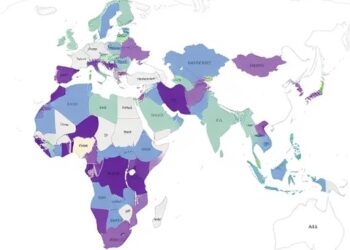(May 31, 2024) — In the years prior to an Alzheimer’s disease or other memory disorder diagnosis, credit scores begin to weaken and payment delinquency begins to increase, concludes new research led by Georgetown University. The findings show consistent deterioration in these financial outcomes over the quarters leading up to diagnosis. The findings also show that credit card and mortgage delinquencies, specifically, both increase substantially prior to diagnosis.
(May 31, 2024) — In the years prior to an Alzheimer’s disease or other memory disorder diagnosis, credit scores begin to weaken and payment delinquency begins to increase, concludes new research led by Georgetown University. The findings show consistent deterioration in these financial outcomes over the quarters leading up to diagnosis. The findings also show that credit card and mortgage delinquencies, specifically, both increase substantially prior to diagnosis.
The research was released today by the Federal Reserve Bank of New York (FRBNY). (“The Financial Consequences of Undiagnosed Memory Disorders”).
“Most memory disorders aren’t diagnosed until symptoms are severe, yet, given the progressive nature of disease, cognitive decline usually starts many years prior,” says health economist and the study’s lead researcher, Carole Roan Gresenz, PhD, a professor in Georgetown’s School of Health and McCourt School of Public Policy. “The earliest changes in cognition might not be noticeable by family members and friends, but may be quietly compromising financial decision-making.”
For the study, Gresenz teamed up with collaborators from Georgetown, including a neurologist who specializes in memory disorders as well as researchers at the FRBNY. They examined the effect of undiagnosed memory disorders on credit outcomes using nationally representative credit reporting data merged with Medicare data (all anonymized). Credit cards and mortgages are the primary components of debt among those 70 years and older.
According to Gresenz, increased credit card delinquency was observed more than five years prior to diagnosis, while mortgage delinquency was seen three years prior.
“The results are striking in their clarity and consistency,” she added. “The financial decline we observe mirrors the cognitive decline that these individuals are experiencing: credit scores consistently decline, quarter by quarter, and probability of delinquency consistently increases as diagnosis approaches.”
The work builds on previous research conducted by Gresenz. That work, which used survey data on roughly 10,000 households, showed that prior to an Alzheimer’s diagnosis, a person in the early stages of the disease faces a heightened risk of adverse financial outcomes — a likely consequence of compromised decision-making when managing money and financial exploitation by others. The research was published in 2019 in the journal Health Economics.
Gresenz added, “In addition to the human toll, a diagnosis of this type can be financially disruptive to families and exacerbated by the harmful financial effects of undiagnosed memory disorders. Our findings substantiate the possible utility of credit reporting data for facilitating early identification of those at risk for memory disorders.”
###
In addition to Gresenz, authors include Jean M. Mitchell and R. Scott Turner of Georgetown and Belicia Rodriguez and Wilbert van der Klaauw‖ of the FRBNY. The authors report having no personal financial interests related to the study.
The research was supported by the National Institute on Aging of the National Institutes of Health (R56AGO53272 and R01AG080623). The content of and views expressed do not necessarily represent the official views of the Federal Reserve Bank of New York or the Federal Reserve System or the National Institutes of Health.
Method of Research
Data/statistical analysis
Subject of Research
People
Article Title
(May 31, 2024) — In the years prior to an Alzheimer’s disease or other memory disorder diagnosis, credit scores begin to weaken and payment delinquency begins to increase, concludes new research led by Georgetown University. The findings show consistent deterioration in these financial outcomes over the quarters leading up to diagnosis. The findings also show that credit card and mortgage delinquencies, specifically, both increase substantially prior to diagnosis. The research was release
COI Statement
The authors report having no personal financial interests related to the study.




